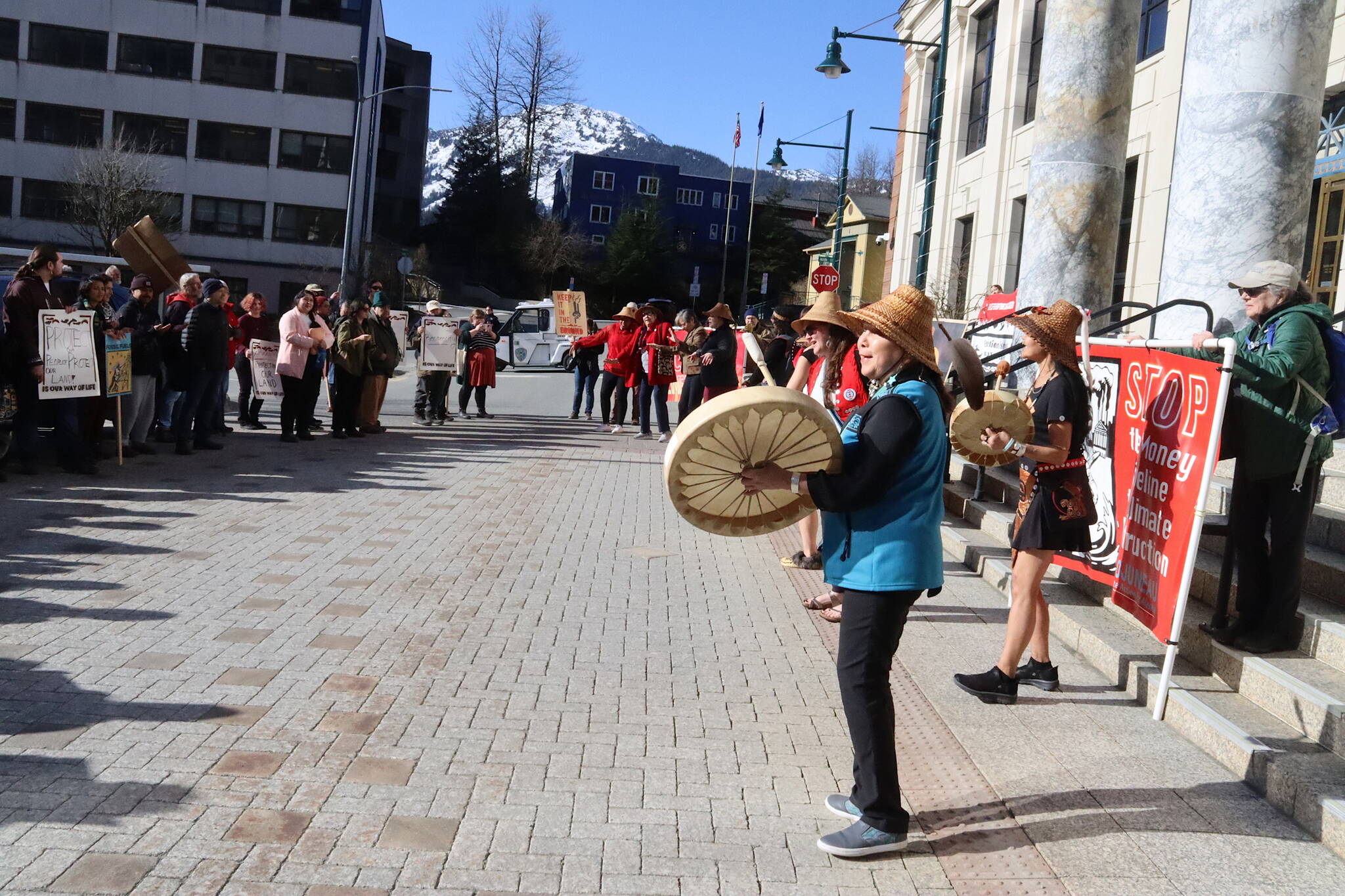Pat White participated in two rallies this week at the Alaska State Capitol, one with an official permit and one without. She had a small concern at the permitted one that the large banner she was holding might be blocking people trying to walk by. But a much bigger worry was the unpermitted event a few days earlier may be illegal in the near future.
White was among about 50 people participating in a climate rally late Thursday morning, which took place on the street in front of the Capitol which was closed for 90 minutes due to a city permit obtained by organizers. On Monday evening she was among about 100 people calling for a ceasefire in Gaza, who were packed tightly on the sidewalk and stairs in front of the building since they had no such permit.
Meanwhile, inside the building, legislators on Thursday held two hearings on a bill by Gov. Mike Dunleavy that would expand the definition of illegal protests and the penalties for them. While the Dunleavy and other supporters say the proposal targets activity that is disruptive and damaging to other people and property, White said she sees it as an indicator of the second-term Republican governor’s potential political ambitions beyond his current office.
“So there is this ideology about suppression of votes and suppression of opinions, and that we’re dangerous people, so I’m not surprised with that,” she said. “I think it’s silly, but I hope it doesn’t pass.”
The text of House Bill 386 (and its companion Senate Bill 255) emphasizes interfering with emergency response officials such as police or firefighters. The legislation elevates some violations to a Class C felony, which can result in up to five years in prison, for obstructing highways and other transportation means such as runways, especially if there is “substantial risk of physical injury to another person; or (interfering) with a firefighting, medical, or other emergency.”
While participants in the Gaza protest on Monday weren’t blocking the street, being on the sidewalk “may fall into the category under this bill,” White said.
The bill also expands “civil liability for obstruction of free passage in public places,” allowing parties to sue for amounts ranging from “$10,000 to a person who suffers only nominal damages” to “$500,000 to a person who suffers death.” Civil penalties can apply to anyone who encourages or aids such protests as well as people who participate in them.
Such laws and restrictions are becoming commonplace in many places, Enei Begaye, executive director of Native Movement, an Alaska-based nonprofit that advocates based on Indigenous environmental practices, told the crowd during Thursday’s rally.
“This is what we’re seeing all over the world and all over the country,” she said. “And it is a rise of authoritarianism that is meant to protect, again, these corporate interests, not meant to protect us as a people or Mother Earth. So I hope you all go to these hearings. I hope you write your legislators. We cannot allow our governor and our lawmakers to put us behind — way far behind — the corporate interests. No, we demand justice for the people. We demand justice for the land.”
HB 386 was advanced out of the House Transportation Committee on Thursday afternoon, following the committee’s second hearing on the proposal. The Senate Transporation Committee held the bill after also hearing SB 255 for the second time, with the bill’s prospects less certain in a 17-member Senate majority that consists of nine Democrats and eight Republicans.
Public testimony submitted to both committees was essentially unanimous in opposition to the bill. Senior officials at the state Department of Law, including Attorney General Treg Taylor, stated in a presentation to the House committee that the bill will continue to protect Alaskans’ constitutional rights of expression.
”The proposed bill is both content and viewpoint neutral,” the text of the proposal states. “It aims to allow Alaskans to seek remedy when their right to access public places is violated, deter and discourage unlawful conduct through stronger criminal penalties, (and) uphold Alaskans’ constitutional right to assembly and demonstration.”
It appears there are few instances of protesters blocking state roads, although specific data isn’t available, wrote Lt. Robert French, supervisor of Anchorage Judicial Services for the Alaska State Troopers, in response to questions from the committee.
The House committee members supported the bill 5-2 along majority/minority lines. Rep. Tom McKay, an Anchorage Republican, said the measure to some degree is intended to prevent problems such as destructive protests that have been widespread in the Lower 48 from becoming common in Alaska.
“There’s plenty of ways for people to protest, there’s permit processes where they can have peaceful organized protests,” he said. “We see right out here in front of the Capitol…We don’t need people gluing themselves to the road so we can’t get to the hospital, we can’t get to the airport. You don’t need people barricading themselves in front of police stations or fire departments or other critical facilities. So I support the bill. And I don’t really see where it’s a big problem for Alaska.”
• Contact Mark Sabbatini at mark.sabbatini@juneauempire.com or (907) 957-2306.

